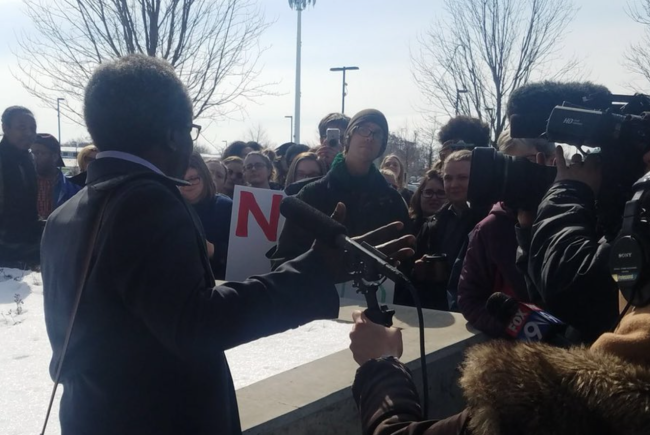You have /5 articles left.
Sign up for a free account or log in.

Mzenga Wanyama addresses supporters Friday in St. Paul.
Mzenga Wanyama, an associate professor of English at Augsburg University, has a month to make plans to return to his native Kenya or face deportation, immigration officials in St. Paul said Friday.
Fearing that Wanyama might be detained during his Friday appointment at the local Immigration and Customs Enforcement headquarters, dozens of student and faculty supporters rallied outside, holding signs saying, “Please Don’t Deport Our Professor.”
Cheering when Wanyama emerged from the building, some vowed to keep raising awareness about his pending deportation -- one of several to involve longtime faculty members in recent weeks.
Wanyama, who came to the U.S. in 1992 to attend graduate school -- first at Howard University and then the University of Minnesota Twin Cities -- has checked in at least quarterly with immigration officials since his request for asylum was rejected in 2010. He has been allowed to stay in the U.S. since that time but was asked to check in with ICE early this month with his family, amid increased agency action against undocumented immigrants with no criminal records.
Wanyama, who did not immediately respond to a request for comment over the weekend, said Friday that he was told to return to ICE with evidence of his plans to return to Kenya. He and his wife, a registered nurse who also has been asked to leave the U.S. for lack of legal status, have three children: two recipients of the expiring Deferred Action for Childhood Arrivals program and one who is an American citizen.
Katheryn Wasylik, Wanyama’s attorney, told the Star-Tribune that all undocumented immigrants are now ICE targets. “I think what has changed is that discretion ICE had to prioritize the individuals who need to leave -- that’s gone now,” she said.
Shawn Neudauer, an ICE spokesperson, said the agency “has instructed [Wanyama] to provide evidence that he intends to comply with the judge’s final order of removal” from 2012.
Wanyama taught at St. Cloud State University before moving to Augsburg a decade ago. He specializes in postcolonial theory and literatures and African-American literary history.
Many of his students have praised his teaching. An online petition signed by more than 11,000 supporters quotes Robert Cowgill, chair of Augsburg’s English department, as saying that Wanyama “is an invaluable tenured member of the Augsburg community. Augsburg's students need Prof. Wanyama.”
Augsburg president Paul C. Pribbenow said in a statement that the institution “believes deeply that our country is great because of our embrace of people from a diversity of life experiences. This is in our mission, and you can see it in our students, faculty and staff.”
Wanyama’s “teaching and research in African-American literary history and in postcolonial theory and literatures play a critical role in our undergraduate curriculum,” Pribbenow said. “His work enriches the education that Augsburg provides, advancing students’ scholarship in writing and literature well beyond what this university would be able to provide without him.”
Calling Wanyama “a role model for the professional aspirations and accomplishments of future leaders in our city and country,” Pribbenow said, “we strongly stand behind him and believe he should be able to stay in the U.S.”
In January, ICE officials arrested Syed Ahmed Jamal, a Park University instructor of chemistry and father of three, on his front lawn in Lawrence, Kans. Jamal, a native of Bangladesh, was granted a temporary stay of deportation last month after he was put on a plane back to his home country. He was offloaded in Hawaii and taken to a detention center there. Jamal’s attorneys have since said that his work permit was valid until October 2018.
Similar to Wanyama, Jamal was ordered deported in 2011 but had been allowed to stay in the U.S. since that time based on regular check-ins with ICE.









